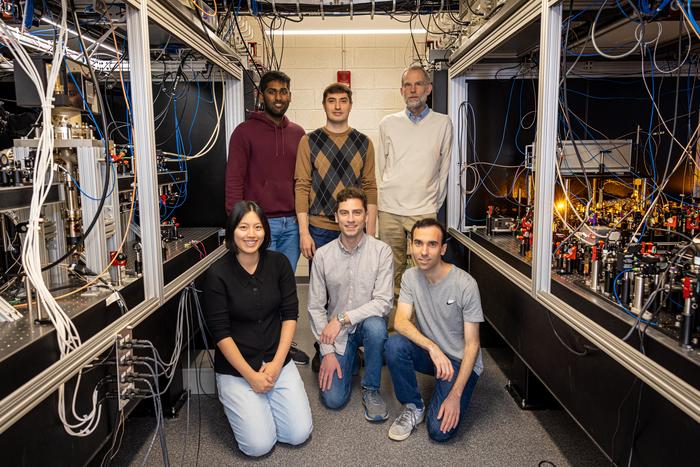Princeton University has launched a new Ph.D. program in Quantum Science and Engineering (QSE), providing graduate training in an emerging discipline at the intersection of quantum physics and information theory. This new field of quantum information science has broad implications and may enable fundamentally new technology, including new types of computers that can solve currently intractable problems, communication channels guaranteed secure by the laws of physics, and sensors that offer unprecedented sensitivity and spatial resolution.

Credit: Richard Soden/Princeton University
Princeton University has launched a new Ph.D. program in Quantum Science and Engineering (QSE), providing graduate training in an emerging discipline at the intersection of quantum physics and information theory. This new field of quantum information science has broad implications and may enable fundamentally new technology, including new types of computers that can solve currently intractable problems, communication channels guaranteed secure by the laws of physics, and sensors that offer unprecedented sensitivity and spatial resolution.
Applications from prospective students are due December 15 for an incoming first class in Fall 2024.
The new doctoral program is part of Princeton’s expanded commitment to quantum science and engineering research and education. The University’s growing programs, along with the ongoing recruitment of top faculty, graduate students, and postdoctoral researchers, reflect the University’s recognition of the transformative potential of quantum science and technology to benefit society in the decades ahead.
According to Andrew Houck, professor of electrical and computer engineering and co-director of the Princeton Quantum Initiative, Princeton is “ramping up efforts across campus to remain the leading place in the world for this kind of science and engineering for many decades.” Ali Yazdani, the Class of 1909 Professor of Physics and co-director alongside Houck, adds that Princeton’s work in this area stands apart from quantum research at other institutions due to the University’s inclusive approach across disciplines and across the spectrum from foundational science to innovative devices.
“A major goal of the program is to form a graduate student community spanning disciplines and research topics, and united by a common scientific language,” according to Nathalie de Leon, associate professor of electrical and computer engineering and the director of graduate studies for QSE. “Our curriculum will place students in an excellent position to build new quantum systems, discover new technological innovations, become leaders in the emergent quantum industry, and make deep, lasting contributions to quantum information science.”
De Leon says the new QSE doctoral program is structured to take advantage of the unique interdisciplinary breadth of Princeton’s quantum community. “Research at Princeton encompasses every layer of the quantum technology stack, bringing together many-body physics, materials, devices, new quantum hardware platforms, quantum information theory, metrology, algorithms, complexity theory, and computer architecture,” explains de Leon. “This vibrant environment allows for rapid progress at the frontiers of quantum science and technology, with cross-pollination among quantum platforms and approaches.”
The initiative also benefits from a growing number of collaborations with scientists at the Princeton Plasma Physics Laboratory, a U.S. Department of Energy national laboratory managed by Princeton; the collaborative work includes designing highly specialized materials such as diamonds and superconducting magnets needed for quantum experiments and technologies.
De Leon adds, “The quantum faculty at Princeton value interdisciplinarity, collaboration, depth, and fostering a close-knit community that enables fundamental and significant advances.”
The QSE program will provide students with a strong foundation of fundamentals, as well as opportunities to explore the frontiers of current research, instruction on reading and understanding literature over an extensive range of topics, and many opportunities for scientific interaction and professional development.
Princeton University’s stipend for graduate students is among the highest in the nation. The University fully funds all Ph.D. students, offering generous tailored support across all years of regular program enrollment. The graduate student experience at Princeton encompasses campus housing, a health plan and benefits, family care assistance, and a wide range of student life programs and traditions that welcome all to participate in the diverse and inclusive Graduate School community.
Prospective students are encouraged to review the degree program requirements and indicate on the application their interest in the broad research areas of quantum systems experiment, quantum systems theory, quantum material science, or quantum computer science.




